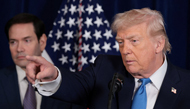Staff Reporter
The South Korean government on Tuesday said it will not lift its import ban on American beef until all suspicions surrounding the U.S. mad cow disease outbreak are cleared away.
In a report to President Roh Moo-hyun at a Cabinet meeting yesterday, Agriculture and Forestry Minister Huh Sang-man said South Korea will also ask the United States to take stricter safety measures.
The announcement came as a three-member delegation led by David Hegwood, a trade adviser to U.S. Agriculture Secretary Ann Veneman, met with South Korean counterparts at the Integrated Government Complex in Kwachon, south of Seoul, yesterday.
Lee Myung-soo, director general of the Ministry of Agriculture and Forestry (MAF), said the two parties agreed it is not a proper time to talk about resuming imports of American beef.
The government also said it is unable to accommodate the U.S. request that American beef shipped before Dec. 23, when the mad cow disease was reported at in Washington State, be cleared for customs inspection and distributed.
``We agreed that it is not the right time to discuss the resumption of the U.S. beef imports,’’ Lee said. ``But the U.S. delegation asked whether the Korean government would be flexible enough to let the American beef in customs clearance warehouses receive clearance if the United States implements measures to guarantee safety in a scientific way. We said no to the question.’’
Lee said the biggest concern of the government is to protect the health of South Koreans. He made it clear that the U.S. had not made a direct request that South Korea scrap the import ban.
A total ban on imports of American beef and beef products was announced on Saturday after the suspected case of the brain-wasting disease tested positive in preliminary lab results early last week. The U.S. delegation arrived here yesterday following a meeting with Japanese policymakers over Tokyo’s ban on imports of American beef. Japan is the largest importer of American beef.
Japan reportedly refused to lift its ban, saying it will not resume imports until the safety of the food is proved. Japan imported $1.03 billion worth of beef and beef products last year, accounting for 32 percent of the U.S. beef exports. South Korea, Japan and Mexico accounted for about 89 percent of U.S. beef exports this year. South Korea imported $655.9 million of U.S. beef last year, according to the ministry.
During the meeting, the delegation explained what the U.S. government has been doing to verify origin of the disease and the whereabouts of beef products suspected to be infected by the disease, Lee said. The delegation said the cow was imported from Canada and the U.S. promised to keep Seoul informed of the progress in its ongoing investigation, he said. He said the delegation, accompanied by two officials from the U.S. Embassy in Seoul, also invited a team of Korean experts to the U.S. at their convenience. Local processed food manufacturers, including Daesang, have begun to recall flavor-enhancing products that contain ingredients derived from U.S. cow parts. Daesang said it has been recalling three monosodium glutamate products at the risk of shouldering about 6 billion won in losses. Ottogi began withdrawing its two instant food products using U.S. cow ingredients from store shelves Friday.
However, CJ, Korea’s biggest maker of processed foods, on Tuesday said it will not recall its flavor-enhancing product containing ingredients derived from U.S. beef as it used only pure meat for its products.
kenbae@koreatimes.co.kr
스마터리빙
more [ 건강]
[ 건강]이제 혈관 건강도 챙기자!
[현대해운]우리 눈에 보이지 않기 때문에 혈관 건강을 챙기는 것은 결코 쉽지 않은데요. 여러분은 혈관 건강을 유지하기 위해 어떤 노력을 하시나요?
 [ 건강]
[ 건강]내 몸이 건강해지는 과일궁합
 [ 라이프]
[ 라이프]벌레야 물럿거라! 천연 해충제 만들기
 [ 건강]
[ 건강]혈압 낮추는데 좋은 식품
[현대해운]혈관 건강은 주로 노화가 진행되면서 지켜야 할 문제라고 인식되어 왔습니다. 최근 생활 패턴과 식생활의 변화로 혈관의 노화 진행이 빨라지고
카테고리 최신기사
- 4기 폐암 치료
- 운명의 한일전, 韓 4강 진출 시 확정... ‘어떻게 이런 행운이’ 日 준결승 선착, 승부차기 끝에 요르단 격파
- 뜨거운 ‘韓日 동맹 라인’ 이토 AS→김민재 골 ‘열도 홀렸다’... 일본 “콤파니 황태자들, 완벽히 해냈다” 찬사
- 마인츠, 하이덴하임 2-1 꺾고 ‘꼴찌 탈출’
- ‘환상 1호골+최고 평점’ 김민재 특급 맹활약, 뮌헨에서 가장 빛났다... ‘17G 무패’ 압도적 우승 페이스
- 이재성이 마인츠 살렸다! 2경기 연속 ‘미친 택배’ 도움... 마인츠, 하이덴하임 잡고 드디어 ‘꼴찌 탈출’
- 한국 U23 아시안컵 8강 상대 ‘호주’ 확정... 중국은 D조 2위 진출
사람·사람들
more
인터뷰-한국어진흥재단… “한국어 확대 체계적으로”
차세대 한국어 및 한국문화 교육을 목표로 활동해 온 한국어진흥재단이 2026년 제16기 이사회에서 유니스 이 이사를 신임 이사장으로 선출하며 …

캘리포니아 태권도협회 이취임식
캘리포니아 태권도협회(CTU) 신년회 및 회장 이·취임식 행사가 지난 10일 오렌지카운티 한인회관에서 열렸다. 이날 행사에서는 용호재 관장이 …
1945년 해방둥이 모임 신년모임
올해로 창립 11주년을 맞은 1945년생 해방둥이 모임(회장 최용자)은 지난 10일 해피 노래교실에서 신년모임을 열고 회원 간 친목을 다졌다.…
전남대 남가주 동문회 신년회
전남대 남가주 총동문회(회장 차흥주)는 지난 10일 아리수 식당에서 동문과 가족들이 참석한 가운데 2026년 신년회를 개최했다. 이날 참석자들…
도산사업회 신년하례식 26일 아로마센터 5층
미주 도산안창호기념사업회(회장 데이빗 곽)는 오는 26일(월) 오후 5시30분 LA 한인타운 아로마센터 5층 더원 뱅큇홀에서 ‘2026 신년하…
많이 본 기사
- 윤 ‘체포 방해’ 징역 5년… “경호처 사병화”
- 굳은 표정의 윤석열
- 연 5조 재정지원 당근… 광주전남 ‘환영’ 대전충남 ‘혹평’
- 미국·대만, ‘상호관세 15%’ 합의… 5,000억달러 대미 투자
- 내란·김건희·채해병 ‘2차 특검법’ 국회 통과
- 트럼프, 1기 때 풀어준 사기꾼 또 사면…고액 후원자 가족도
- 노벨상 메달 트럼프에 헌납한 마차도에 노르웨이 ‘부글’
- 사유리, 젠 위한 아빠인가..기모노 입고 함께 한 가족 사진이 주목받는 이유
- 필리핀 거대 쓰레기더미 붕괴 사망자 28명·실종자 8명
- “인천공항서 생돈 ‘50만원’ 날렸어요”…엉엉 운 외국인 관광객, 왜?
- 푸틴, 한국에 “관계 회복 기대”
- 미국발 관세 불확실성 재부상… 코스피 영향 촉각
- TSMC ‘미 생산 비례’ 관세 면제… 반도체 추가투자 압박 우려
- 아유미, 갑작스러운 사업가 남편 차단 “그냥 쉬고 싶을 때”
- 지상렬, ♥신보람과 열애 인정 후 첫 동반 등장..애칭=자기 [살림남]
- 장동혁, 국회서 ‘쌍특검 단식’ 사흘째… “아침에는 말도 잘 못해”
- 통합특별시에 20조씩(4년간) 푼다 준서울시 지위 부여도 약속
- 아소 전 일본 총리 “북중러에 함께 대비를”
- 러트닉 “美에 투자하지 않으면 반도체 100% 관세”…한국 등 압박
- “법무부, ‘이민단속 방해 혐의’ 미네소타 주지사 등 수사”
- 경찰, ‘공천헌금’ 김경과 진술 엇갈린 강선우 前보좌관 재소환
- “전세계 금수저들, 향후 10년간 4조달러대 부동산 상속받는다”
- 전자담배 폭발해 차까지 불타고 사용자 심한 화상…코트 주머니 속에서 갑자기 ‘펑’
- “모델 같은 얼굴, 재산 노렸나” 박나래 전 남친 사태..기안84 발언 ‘파묘’
- 운명의 한일전, 韓 4강 진출 시 확정... ‘어떻게 이런 행운이’ 日 준결승 선착, 승부차기 끝에 요르단 격파
- “트럼프, 가자 평화이사회로 우크라·베네수 갈등 중재도 타진”
- 구글, ‘검색 독점’ 판결에 항소… “사람들이 원해서 썼을뿐”
- 보모와 불륜 북VA 남성, 완전범죄 노리고…
- [인터뷰] 연세 글로벌 YG CEO “수준 높은 대면 강의… 강력한 네트웍”
- 전기료 민심 우려 트럼프 정부 “AI기업은 발전비용 자부담하라”
- 뉴욕증시, 고점 부담 속 잘 나가는 마이크론…하락 마감
- 트럼프의 마러라고 자택 인근 도로 ‘트럼프 불러바드’로 개명
- “박찬욱 ‘어쩔수가없다’, 미국서 韓영화 역대2위 흥행 예상”
- 커쇼 은퇴 번복, WBC 전격 출전→류현진과 맞대결 가능성
- 트럼프 대통령이 의장맡은 ‘가자 평화委’ 위원 루비오·블레어 등 7인
- 美 “반도체관세 국가별로 합의”…대만기준 韓에 동일적용 아냐
- 오픈AI, 미국서 챗GPT에 광고 도입…무료·저가요금제에 적용
- “방탄소년단 부산오는데 한 몫 잡자”..숙소비 10배→강제 취소까지 ‘논란’
- ‘결혼 17년 차’ 야노 시호, 정성껏 에르메스 골랐는데.. “필요 없다” 명품 거절한 추성훈에 충격
- ‘징역 5년’ 첫 단죄 尹 남은 재판만 7개…내달 내란 선고
- 美, 이르면 내달 54년만의 달궤도 유인비행…17일 로켓 발사대로
- 美항공청, 중남미 영공 비행 주의보 “군활동·GPS교란 위험”
- South Korea’s ‘Passport Power’ Remains in World’s Top Tier for 6th Straight Year
- 차기 연준의장 인선 판도변화…해싯 지고 워시 부상
- 대법, 오는 20일 판결선고일로 예고…관세 결론 나올지 주목
- 트럼프, 이란 군사옵션 잠정보류?… “교수형 취소가 큰 영향”
- 트럼프 “그린란드 문제 협조 않는 나라에 관세 부과할 수도”
- 자동차 재산세 폐지 법안 나올까 2
- 위대한 통일 비전이 위대한 나라를 탄생시킨다
- ‘별거 고백’ 슈, ♥임효성과 두 달 째 연락 두절.. “화해하고 파” 속내 고백
1/5지식톡

-
 한국 안경을 무료 배송으로 받아보실…
0
한국 안경을 무료 배송으로 받아보실…
0안녕하세요. 서울 안암동에 위치한 ‘보고싶다 안경원’입니다.저희는 다년간 한국 고객분들께 착용감 좋은 안경테와 한국안경브랜드,고압축 도수 렌즈를 합리적인 가격에 제공해온 안경 전문점입니다.이번에 해외 배송이 가능해…
-
 미 육군 사관학교 West Poin…
0
미 육군 사관학교 West Poin…
0https://youtu.be/SxD8cEhNV6Q연락처:wpkapca@gmail.comJohn Choi: 714-716-6414West Point 합격증을 받으셨나요?미 육군사관학교 West Point 학부모 모…
-
 ☝️해외에서도 가능한 한국어 선생님…
0
☝️해외에서도 가능한 한국어 선생님…
0이 영상 하나면 충분합니다!♥️상담신청문의♥️☝️ 문의 폭주로 '선착순 상담'만 진행합니다.☎️ : 02-6213-9094✨카카오톡ID : @GOODEDU77 (@골뱅이 꼭 붙여주셔야합니다…
-
 테슬라 자동차 시트커버 장착
0
테슬라 자동차 시트커버 장착
0테슬라 시트커버, 사놓고 아직 못 씌우셨죠?장착이 생각보다 쉽지 않습니다.20년 경력 전문가에게 맡기세요 — 깔끔하고 딱 맞게 장착해드립니다!장착비용:앞좌석: $40뒷좌석: $60앞·뒷좌석 …
-
 식당용 부탄가스
0
식당용 부탄가스
0식당용 부탄가스 홀세일 합니다 로스앤젤레스 다운타운 픽업 가능 안녕 하세요?강아지 & 고양이 모든 애완동물 / 반려동물 식품 & 모든 애완동물/반려동물 관련 제품들 전문적으로 홀세일/취급하는 회사 입니다 100% …
케이타운 1번가
오피니언

한인 2세들 ‘족쇄’ 국적법 신속 개정해야

노동법 준수로 공정의 새해 열자
 조지 F·윌 워싱턴포스트 칼럼니스트
조지 F·윌 워싱턴포스트 칼럼니스트 [조지 F. 윌 칼럼] 올 중간선거를 덜 불쾌하게 만드는 길
 최규성 삼성서울병원 이식외과 교수
최규성 삼성서울병원 이식외과 교수 [로터리] ‘토의 간’
 전병두 서북미수필가협회 회원
전병두 서북미수필가협회 회원 [금요단상] 꿀벌과의 인연
 심상용 / 서울대 미술관장
심상용 / 서울대 미술관장 [미술 다시보기] 모네와 연작의 경제학
 김정곤 / 서울경제 논설위원
김정곤 / 서울경제 논설위원 [만화경] 애플·구글 ‘적과의 동침’
 한 영 재미수필가협회 회장
한 영 재미수필가협회 회장 [한영의 독서칼럼] 햇살을 향해 헤엄치기
 이규민 한식진흥원 이사장
이규민 한식진흥원 이사장 [로터리] 시간을 담그는 문화, 한국의 장
1/3지사별 뉴스

뉴욕한인회‘제123주년 미주한인의 날’ 기념식 성황
뉴욕한인회(회장 이명석)가 13일 맨하탄 뉴욕한인회관에서 개최한‘제123주년 미주한인의 날’ 기념 행사가 각계에서 활동 중인 1.5세 및 2세…
국적이탈 수속에 2년이나 걸리다니⋯

연방의회서 “한인 위상·한미동맹 제고” 한목소리
한인 이민자들이 미국에 도착한 123주년을 기념하고 한인들의 미국 사회에의 기여를 알리는 ‘제 21회 미주 한인의 날’ 행사가 13일 연방의회…
보모와 불륜 북VA 남성, 완전범죄 노리고…

한미수교 100주년 기념 조형물 재설치 가능성 보인다
샌프란시스코 공원에 설치되어 있다 철거되어 창고에 보관중인 한미수교 100주년 기념 조형물이 다시 설치될 가능성이 열렸다.한국 국회 재정경제기…
재미한국학교협의회



















































.png)


댓글 안에 당신의 성숙함도 담아 주세요.
'오늘의 한마디'는 기사에 대하여 자신의 생각을 말하고 남의 생각을 들으며 서로 다양한 의견을 나누는 공간입니다. 그러나 간혹 불건전한 내용을 올리시는 분들이 계셔서 건전한 인터넷문화 정착을 위해 아래와 같은 운영원칙을 적용합니다.
자체 모니터링을 통해 아래에 해당하는 내용이 포함된 댓글이 발견되면 예고없이 삭제 조치를 하겠습니다.
불건전한 댓글을 올리거나, 이름에 비속어 및 상대방의 불쾌감을 주는 단어를 사용, 유명인 또는 특정 일반인을 사칭하는 경우 이용에 대한 차단 제재를 받을 수 있습니다. 차단될 경우, 일주일간 댓글을 달수 없게 됩니다.
명예훼손, 개인정보 유출, 욕설 등 법률에 위반되는 댓글은 관계 법령에 의거 민형사상 처벌을 받을 수 있으니 이용에 주의를 부탁드립니다.
Close
x